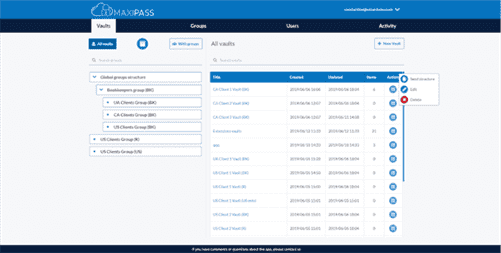Most on-demand CRM solutions offer integrations with the most popular apps like Gmail, Outlook, MailChimp, and DocuSign. Apptivo’s strength lies in the value of its assorted business apps, which are all offered at one competitive price. The platform offers a full spectrum of services from sales and marketing to billing and support, and promises to provide a 360° view of your customer base in a way that promotes system-wide synergy. Like many CRM providers, Salesforce has a mobile app that lets sales teams take their business on-the-go. Its Mobile Publisher feature allows users to build apps with brand consistency. They can customize the color, icons, and names seen by their employees.

Having cloud CRM software means having access to information at all times, regardless of location, laid out in clear dashboards and an easy-to-understand representation of your sales pipeline. There’s a plethora of great email marketing and email automation solutions available, such as Campaigns. Campaigns lets you send out automated campaigns with branching options for different levels of lead response. It supports dynamic content so you can target high-value contacts while still appealing to your leads with the right level of human interaction.
Business goals
Whether you requested bug fixes, additional security, or extra features, the IT team would work over a day or several to get it all installed. Instead of worrying about an unnamed, faceless threat then, perhaps stress about those in your office or within https://www.globalcloudteam.com/ your company who could make a costly mistake. According to Florida-based cloud service DSM, most cyber-attacks and data breaches can be attributed to human mistakes. You might also want to consider training your team on how to use the cloud itself.
- But not every business has the resources to build and maintain the kind of infrastructure needed to run on-premise CRM software.
- It comes equipped with a range of collaborative features that foster teamwork and cooperation among your staff.
- Whether you requested bug fixes, additional security, or extra features, the IT team would work over a day or several to get it all installed.
- This is where exactly choosing a CRM (Customer Relationship Management) comes into play.
- Whether you add or lose staff, your software will accommodate you without becoming an expensive albatross.
This means you and your colleagues or employees can work from home, on the go, or the beach! Not being tied down to a location or device allows you to manage customer interactions or relationships on your terms. Most business leaders are fearful of using cloud-based CRM systems because of the installation process. The cloud-based CRM software development has you automatically up and running in no time. With cloud CRM, you pay on a subscription basis which allows you to easily scale your CRM as per your business needs.
How to find the right cloud-based CRM
While buying software, security is always the topmost concern of every organization. It is also reliable in cases of server breakdowns, as the data has a backup on the cloud. Business spokespersons have listed the following as their key concerns in terms of security. Everyone who has access to your CRM can work together through this shared record.
In a fast-paced business environment, where agility and responsiveness are crucial, the real-time update capability of Cloud CRM software becomes a valuable asset for your organization. Your data in a Cloud CRM system is typically encrypted, protecting it from unauthorized access. Moreover, regular automated backups ensure that even in the face of unforeseen events, such as hardware failures or data breaches, your critical information remains secure and recoverable. The need for a Business Continuity Plan (BCP) has increased dramatically. In recent years, the threat of cyber-attacks and terrorism has increased in addition to natural disasters, so it is essential to create a BCP and be prepared to continue business under any circumstances. The data managed by cloud CRM is typically distributed across multiple data centers.
Related Content
In addition, by offering 24×7 access to the system, a cloud-based CRM offers employees the flexibility and freedom to do what they need to do when they need to do it. The most substantial investment with traditional CRM systems was upfront capital expenditures but not anymore. Like other cloud solutions, cloud-based CRMs operate on a pay-as-you-go subscription model. With minimal upfront investment, cloud-based CRMs reduce the chances of risk and enables smaller organizations to achieve economies of scale sooner. QuarterOne lets you measure the success of your sales force and predict the growth of your sales pipeline. This will ensure your management and finance teams are as happy with your cloud CRM as your sales team.
However, scaling out and scaling up servers is not an easy task due to the procurement and maintenance costs involved. With cloud CRM, you can easily and quickly scale resources by changing plans and adding storage capacity, significantly reducing response costs. It’s also flexible enough to handle the need to shrink your CRM system.
What’s the difference between CRM and ERP
Companies want to get the system up and running as soon as possible since the delay of each minute affects business operations. Cloud CRMs are also an ideal choice for small and large businesses since they can be adjusted to suit your business needs. For example, a small business can use a CRM system with minimal features, whereas a large company can sign up for a different package. Remember that you can quickly update a CRM system to match your business needs. From saving time and money to making things easier and more efficient, using anything other than Cloud CRM solutions becomes hard to comprehend once the switch has been made.

We live in a digital world, where mobile devices dictate our daily chores. Cloud CRM seamlessly fits into this mobile-friendly era by not limiting its access to desktops and laptops. Access CRM on-the-go and multiply business productivity with the aid of CRM mobile apps that simplify data management. Eliminate costs, as there is no need to invest a heavy sum on expensive IT infrastructure. You would be happy to know that cloud CRM does not require servers or any other expensive equipment. A happy customer is a recurring customer, hence companies bend over backward to maximize customer satisfaction to improve profits.
Lowered Costs
For example, when a salesperson speaks with a customer and learns more about them, they can fill in certain fields in that person’s record or make notes on their file. This helps make sure the rest of benefits of cloud crm the team is working with the latest details and to the best of their ability. Marketing, sales, commerce, and customer service work together seamlessly instead of worrying about siloed information.

Mid- to large-scale companies use Creatio to manage the entire customer journey with efficiency. With on-premise/installed software, on the other hand, the business owns and maintains the servers, networks, security, and hardware needed to install and run the program. Having the resources to host and manage that much data requires some hefty upfront costs. And it usually requires having a dedicated IT person to maintain the software in the data center.
How Cloud CRM Software Is Helping Businesses in 2022?
Having access to unified company information allows businesses to organize data and gain accurate insights about inventory, customer leads, and profitability. Cloud-based analytics can integrate information from multiple sources, then use data visualization or predictive modeling to support better, faster decisions. Speed to insight, as well as data sharing and collaboration is a critical benefit of cloud CRM. Cloud CRM software can also improve productivity through collaboration and project management features. When you compare CRM software, you’ll quickly find that some solutions offer more functionality than others. From software deployment, to mobility, to wearable technology, cloud computing has transformed seemingly every aspect of modern business.
